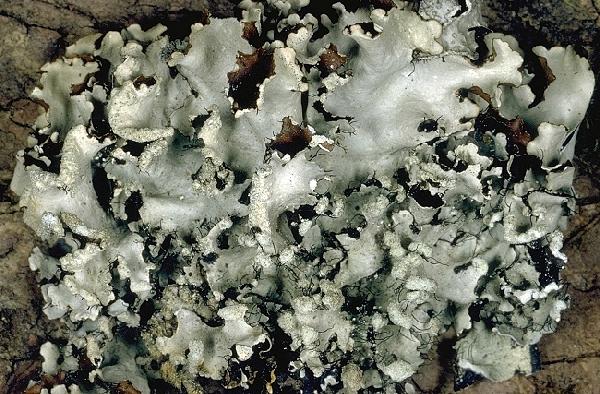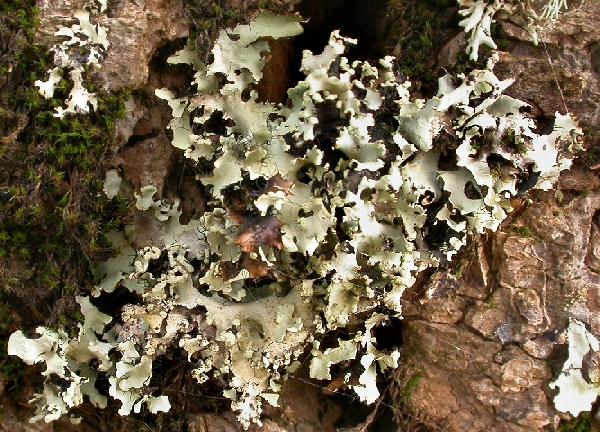Parmotrema arnoldii (Du Rietz) Hale
Phytologia, 28: 335, 1974. Basionym: Parmelia arnoldii Du Rietz - Nyt. Mag. Naturvid., 62: 80, 1924.
Synonyms:
Distribution: N - Frl (Tretiach 1993, Nascimbene & al. 1998), Ven (Lazzarin 1997, Nascimbene & al. 2010b), TAA (Nascimbene & al. 2022, Pistocchi & al. 2024), Lomb (Gheza 2019, Ravera & al. 2021c).
Description: Thallus foliose, heteromerous, dorsiventral, broad-lobed, loosely adnate, irregularly shaped, 5-20 cm in diam., sorediate. Lobes 5-15(-20) mm wide, often slightly imbricate, at first flat then concave, with ascending, rotund or undulate margins, with often conspicuous, black, to 5 mm long marginal cilia. Upper surface grey with some blackened areas, smooth, dull to somewhat shiny, faintly white-maculate, with granular soredia arranged in globose to finally linear, marginal to submarginal soralia. Lower surface black with a brown, naked marginal zone, centrally with dark, simple rhizines. Upper cortex of tightly packed, anticlinally oriented hyphae, with a pored epicortex, the cell walls with lichenan intermediate between the Cetraria- and the Xanthoparmelia-types; medulla white; algal layer continuous; lower cortex prosoplectenchymatous, with rounded and thick-walled cells. Apothecia very rare, lecanorine, substipitate, up to 10 mm across, with a brown, often perforate disc and a smooth to sorediate thalline margin. Epithecium brownish; hymenium and hypothecium colourless. Asci 8-spored, clavate, Lecanora-type. Ascospores 1-celled, hyaline, ellipsoid to broadly ellipsoid, 15-22 x 9.5-12 µm. Pycnidia rare, black, laminal, immersed. Conidia long-bacilliform to thread-like, 10-14 x 0.5-1 µm. Photobiont chlorococcoid. Spot tests: upper cortex K+ yellow, C-, KC-, P- or P+ faintly yellow; medulla K-, C-, KC+ red, P-, UV+ ice-blue. Chemistry: upper cortex with atranorin and chloroatranorin; medulla with alectoronic acid (major) and α-collatolic acid (minor).Note: a cool-temperate to tropical lichen, in Italy restricted to humid beech forests; it frequently grows in the upper branches of the tree canopy in forests with frequent fog, and therefore it often goes unnoticed. A dubious old record from Valle d'Aosta (see Piervittori & Isocrono 1999) is not accepted here. It is included in the Italian red list of epiphytic lichens as “Endangered” (Nascimbene & al. 2013c).
Growth form: Foliose, broad lobed
Substrata: bark
Photobiont: green algae other than Trentepohlia
Reproductive strategy: mainly asexual, by soredia, or soredia-like structures (e.g. blastidia)
Most common in areas with a humid-warm climate (e.g. most of Tyrrenian Italy)
Commonnes-rarity: (info)
Alpine belt: absent
Subalpine belt: absent
Oromediterranean belt: absent
Montane belt: very rare
Submediterranean belt: absent
Padanian area: absent
Humid submediterranean belt: absent
Humid mediterranean belt: absent
Dry mediterranean belt: absent
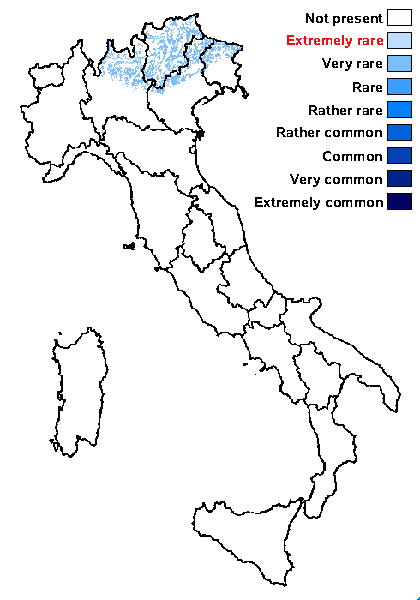
Predictive model
Herbarium samples
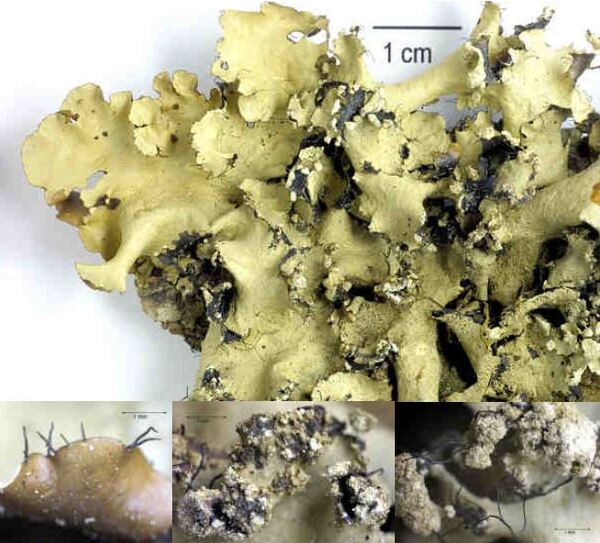

Felix Schumm – CC BY-SA 4.0
Image from: F. Schumm (2008) - Flechten Madeiras, der Kanaren und Azoren. Beck, OHG - ISBN: 978-3-00-023700-3
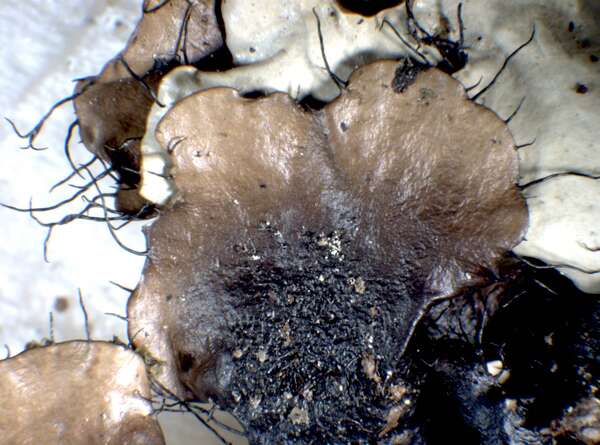

P.L. Nimis; Owner: Department of Life Sciences, University of Trieste
Herbarium: TSB (14789)
2001/11/28
detail of lower surface
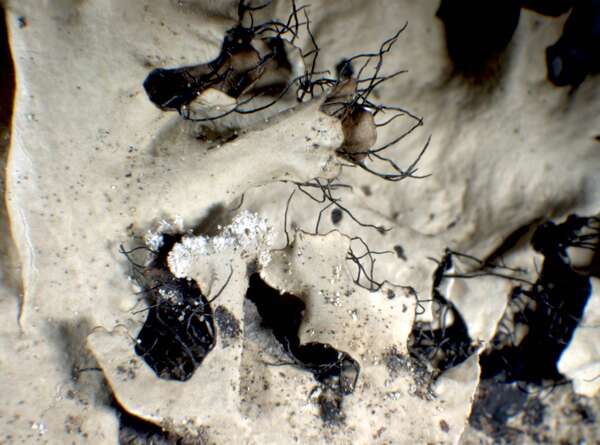

P.L. Nimis; Owner: Department of Life Sciences, University of Trieste
Herbarium: TSB (14789)
2001/11/28
detail of soralium and marginal cilia
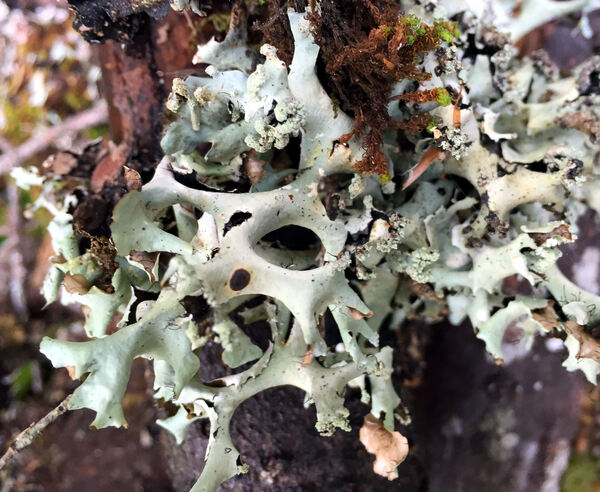

P.L. Nimis; Owner: Department of Life Sciences, University of Trieste
Italy, Friuli Venezia Giulia, Udine, Bosco della Stua, Lago di Sauris, 1000m
09.09.2016
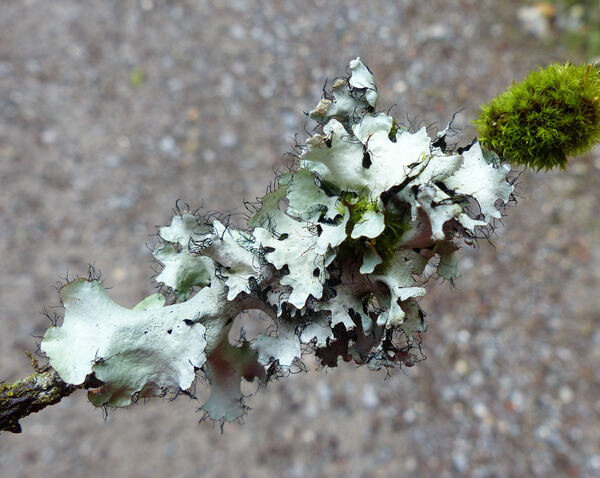

Andrea Moro; Owner: Department of Life Sciences, University of Trieste
Italy, Friuli Venezia Giulia, Udine, Lago di Sauris, Bosco della Stua, Carnic Alps (Ampezzo Carnico) 1000 m; altitude: 1000 m
12/08/2017
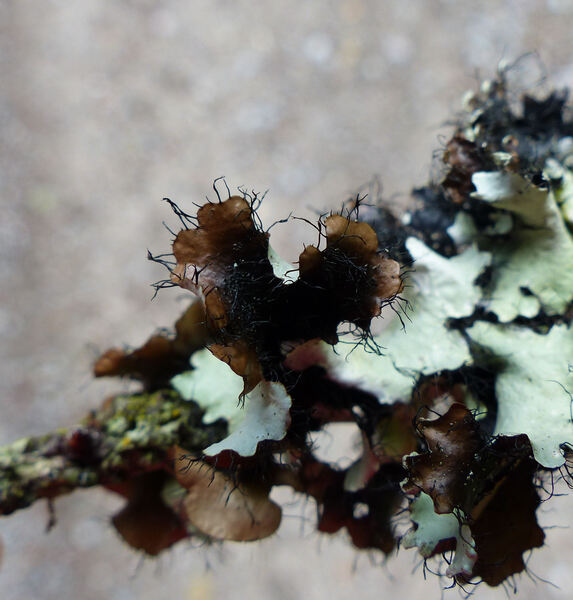

Andrea Moro; Owner: Department of Life Sciences, University of Trieste
Italy, Friuli Venezia Giulia, Udine, Lago di Sauris, Bosco della Stua, Carnic Alps (Ampezzo Carnico) 1000 m; altitude: 1000 m
12/08/2017
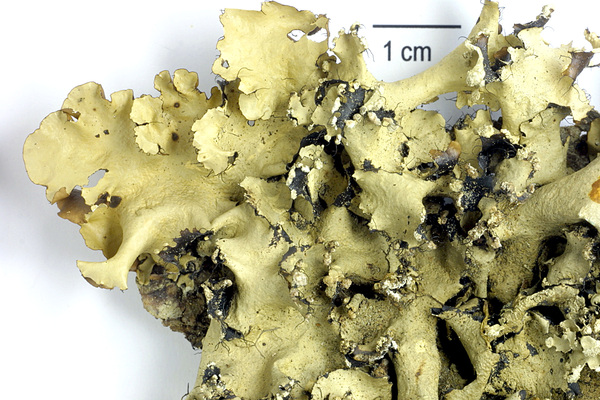

Felix Schumm - CC BY-SA 4.0
[2300], Österreich, Zillertaler Alpen, Hainzenberg (bei Zell am Ziller), ca. 1100 m, an Picea. Leg. Schumm 01.08.1976, det. Schumm 1976.
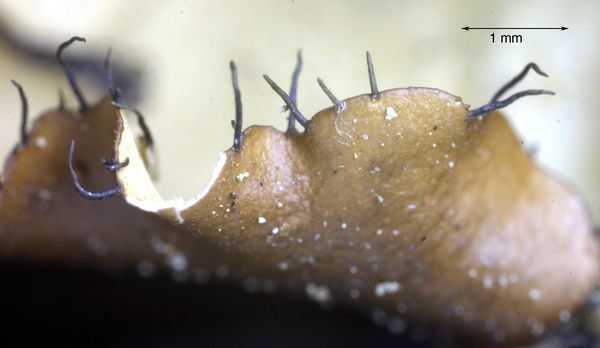

Felix Schumm - CC BY-SA 4.0
[2300], Österreich, Zillertaler Alpen, Hainzenberg (bei Zell am Ziller), ca. 1100 m, an Picea. Leg. Schumm 01.08.1976, det. Schumm 1976.
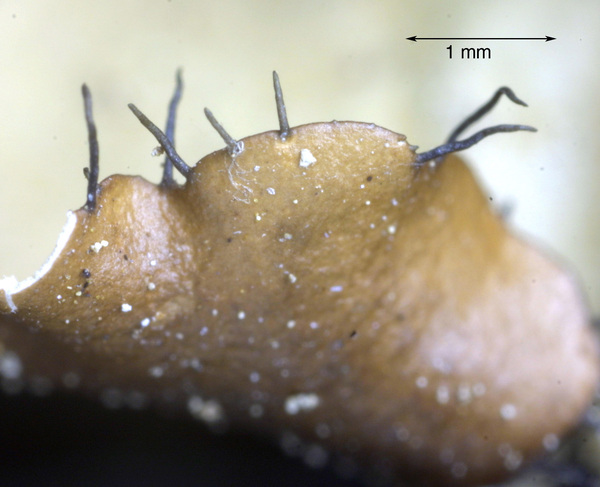

Felix Schumm - CC BY-SA 4.0
[2300], Österreich, Zillertaler Alpen, Hainzenberg (bei Zell am Ziller), ca. 1100 m, an Picea. Leg. Schumm 01.08.1976, det. Schumm 1976.
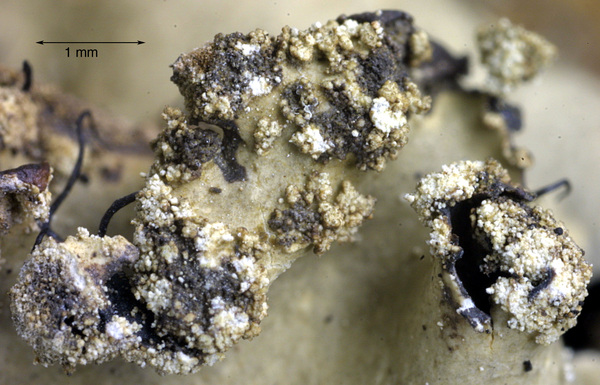

Felix Schumm - CC BY-SA 4.0
[2300], Österreich, Zillertaler Alpen, Hainzenberg (bei Zell am Ziller), ca. 1100 m, an Picea. Leg. Schumm 01.08.1976, det. Schumm 1976.
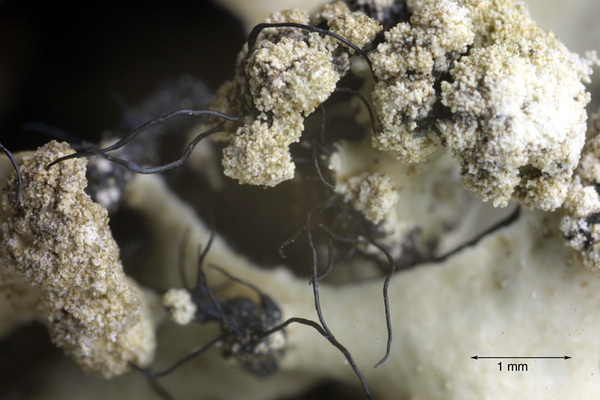

Felix Schumm - CC BY-SA 4.0
[2300], Österreich, Zillertaler Alpen, Hainzenberg (bei Zell am Ziller), ca. 1100 m, an Picea. Leg. Schumm 01.08.1976, det. Schumm 1976.
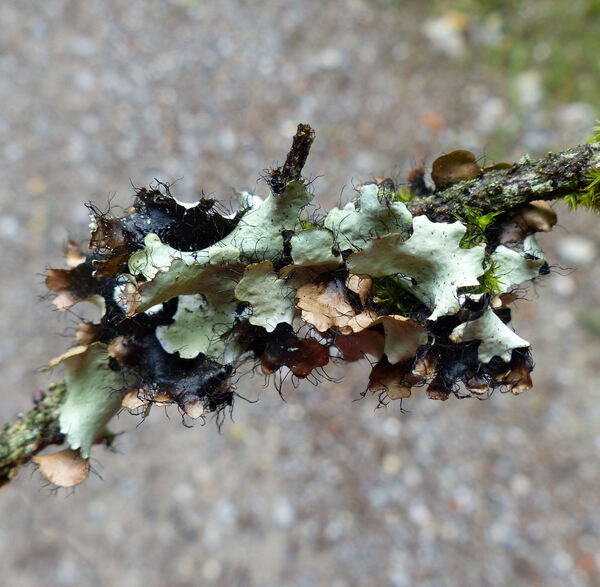

Andrea Moro; Owner: Department of Life Sciences, University of Trieste
Italy, Friuli Venezia Giulia, Udine, Lago di Sauris, Bosco della Stua, Carnic Alps (Ampezzo Carnico) 1000 m; altitude: 1000 m
12/08/2017
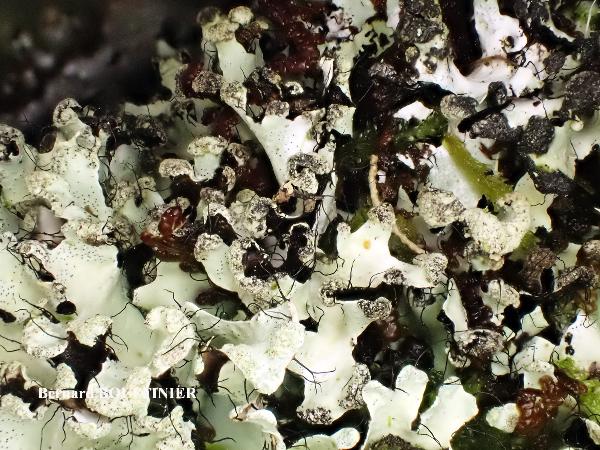
Bernard Bouffinier - Source: http://www.lichensmaritimes.org/index.php?task=fiche&lichen=728&lang=en
France, Huelgoat
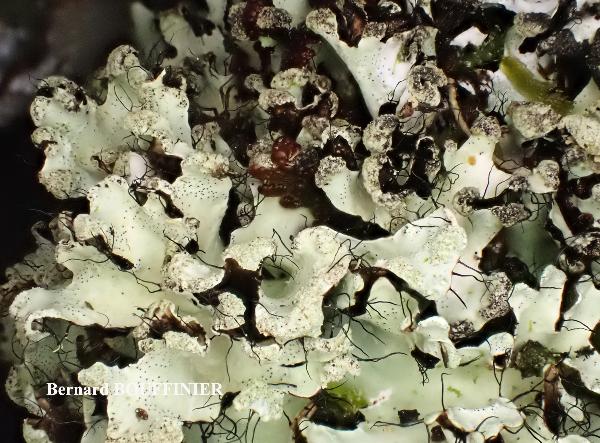
Bernard Bouffinier - Source: http://www.lichensmaritimes.org/index.php?task=fiche&lichen=728&lang=en
France, Huelgoat
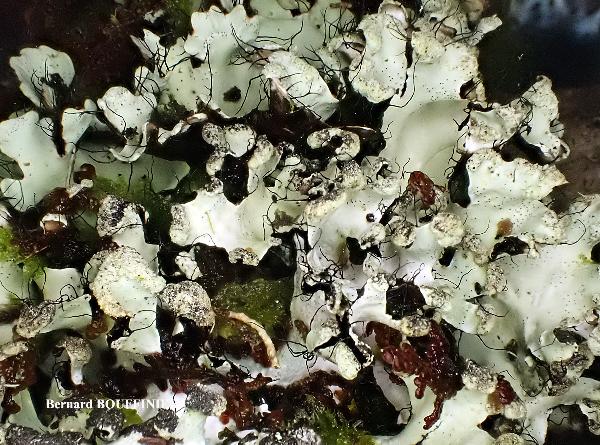
Bernard Bouffinier - Source: http://www.lichensmaritimes.org/index.php?task=fiche&lichen=728&lang=en
France, Huelgoat
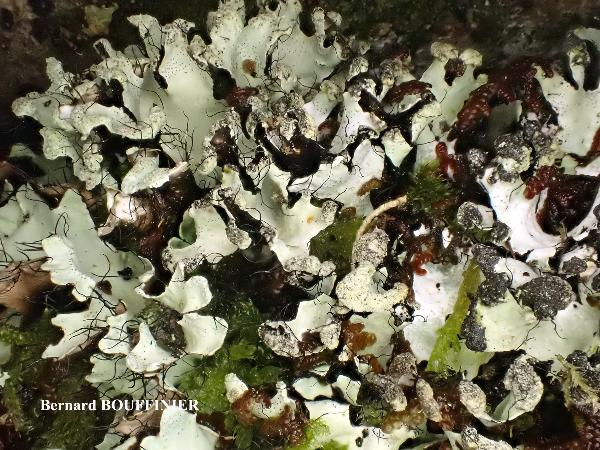
Bernard Bouffinier - Source: http://www.lichensmaritimes.org/index.php?task=fiche&lichen=728&lang=en
France, Huelgoat
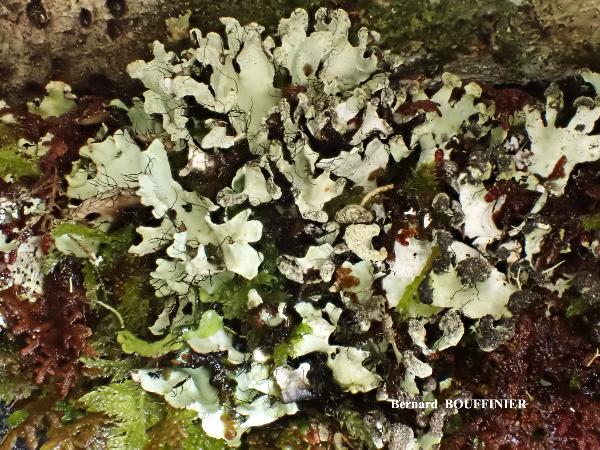
Bernard Bouffinier - Source: http://www.lichensmaritimes.org/index.php?task=fiche&lichen=728&lang=en
France, Huelgoat
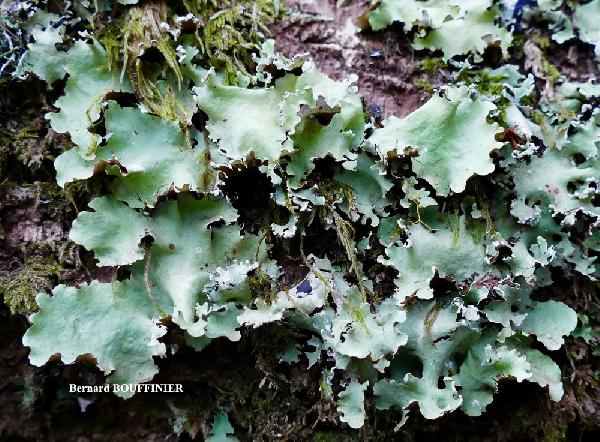
Bernard Bouffinier - Source: http://www.lichensmaritimes.org/index.php?task=fiche&lichen=728&lang=en
Spain, Canary Islands, Tenerife
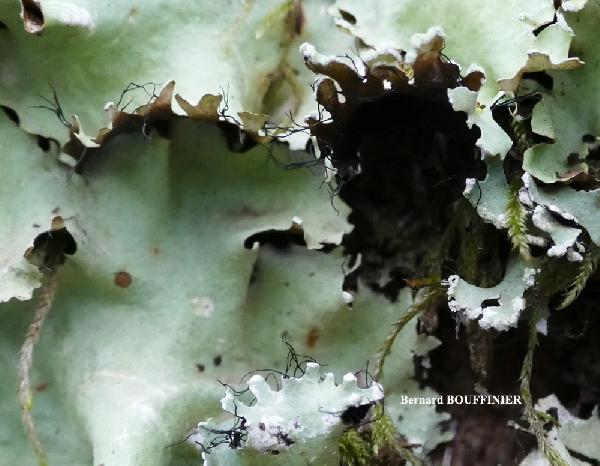
Bernard Bouffinier - Source: http://www.lichensmaritimes.org/index.php?task=fiche&lichen=728&lang=en
Spain, Canary Islands, Tenerife
Growth form: Foliose, broad lobed
Substrata: bark
Photobiont: green algae other than Trentepohlia
Reproductive strategy: mainly asexual, by soredia, or soredia-like structures (e.g. blastidia)
Most common in areas with a humid-warm climate (e.g. most of Tyrrenian Italy)
Commonnes-rarity: (info)
Alpine belt: absent
Subalpine belt: absent
Oromediterranean belt: absent
Montane belt: very rare
Submediterranean belt: absent
Padanian area: absent
Humid submediterranean belt: absent
Humid mediterranean belt: absent
Dry mediterranean belt: absent

Predictive model
| Herbarium samples |


Felix Schumm – CC BY-SA 4.0
Image from: F. Schumm (2008) - Flechten Madeiras, der Kanaren und Azoren. Beck, OHG - ISBN: 978-3-00-023700-3


P.L. Nimis; Owner: Department of Life Sciences, University of Trieste
Herbarium: TSB (14789)
2001/11/28
detail of lower surface


P.L. Nimis; Owner: Department of Life Sciences, University of Trieste
Herbarium: TSB (14789)
2001/11/28
detail of soralium and marginal cilia


P.L. Nimis; Owner: Department of Life Sciences, University of Trieste
Italy, Friuli Venezia Giulia, Udine, Bosco della Stua, Lago di Sauris, 1000m
09.09.2016


Andrea Moro; Owner: Department of Life Sciences, University of Trieste
Italy, Friuli Venezia Giulia, Udine, Lago di Sauris, Bosco della Stua, Carnic Alps (Ampezzo Carnico) 1000 m; altitude: 1000 m
12/08/2017


Andrea Moro; Owner: Department of Life Sciences, University of Trieste
Italy, Friuli Venezia Giulia, Udine, Lago di Sauris, Bosco della Stua, Carnic Alps (Ampezzo Carnico) 1000 m; altitude: 1000 m
12/08/2017


Felix Schumm - CC BY-SA 4.0
[2300], Österreich, Zillertaler Alpen, Hainzenberg (bei Zell am Ziller), ca. 1100 m, an Picea. Leg. Schumm 01.08.1976, det. Schumm 1976.


Felix Schumm - CC BY-SA 4.0
[2300], Österreich, Zillertaler Alpen, Hainzenberg (bei Zell am Ziller), ca. 1100 m, an Picea. Leg. Schumm 01.08.1976, det. Schumm 1976.


Felix Schumm - CC BY-SA 4.0
[2300], Österreich, Zillertaler Alpen, Hainzenberg (bei Zell am Ziller), ca. 1100 m, an Picea. Leg. Schumm 01.08.1976, det. Schumm 1976.


Felix Schumm - CC BY-SA 4.0
[2300], Österreich, Zillertaler Alpen, Hainzenberg (bei Zell am Ziller), ca. 1100 m, an Picea. Leg. Schumm 01.08.1976, det. Schumm 1976.


Felix Schumm - CC BY-SA 4.0
[2300], Österreich, Zillertaler Alpen, Hainzenberg (bei Zell am Ziller), ca. 1100 m, an Picea. Leg. Schumm 01.08.1976, det. Schumm 1976.


Andrea Moro; Owner: Department of Life Sciences, University of Trieste
Italy, Friuli Venezia Giulia, Udine, Lago di Sauris, Bosco della Stua, Carnic Alps (Ampezzo Carnico) 1000 m; altitude: 1000 m
12/08/2017

Bernard Bouffinier - Source: http://www.lichensmaritimes.org/index.php?task=fiche&lichen=728&lang=en
France, Huelgoat

Bernard Bouffinier - Source: http://www.lichensmaritimes.org/index.php?task=fiche&lichen=728&lang=en
France, Huelgoat

Bernard Bouffinier - Source: http://www.lichensmaritimes.org/index.php?task=fiche&lichen=728&lang=en
France, Huelgoat

Bernard Bouffinier - Source: http://www.lichensmaritimes.org/index.php?task=fiche&lichen=728&lang=en
France, Huelgoat

Bernard Bouffinier - Source: http://www.lichensmaritimes.org/index.php?task=fiche&lichen=728&lang=en
France, Huelgoat

Bernard Bouffinier - Source: http://www.lichensmaritimes.org/index.php?task=fiche&lichen=728&lang=en
Spain, Canary Islands, Tenerife

 INDEX FUNGORUM
INDEX FUNGORUM
 GBIF
GBIF
 DOLICHENS
DOLICHENS
